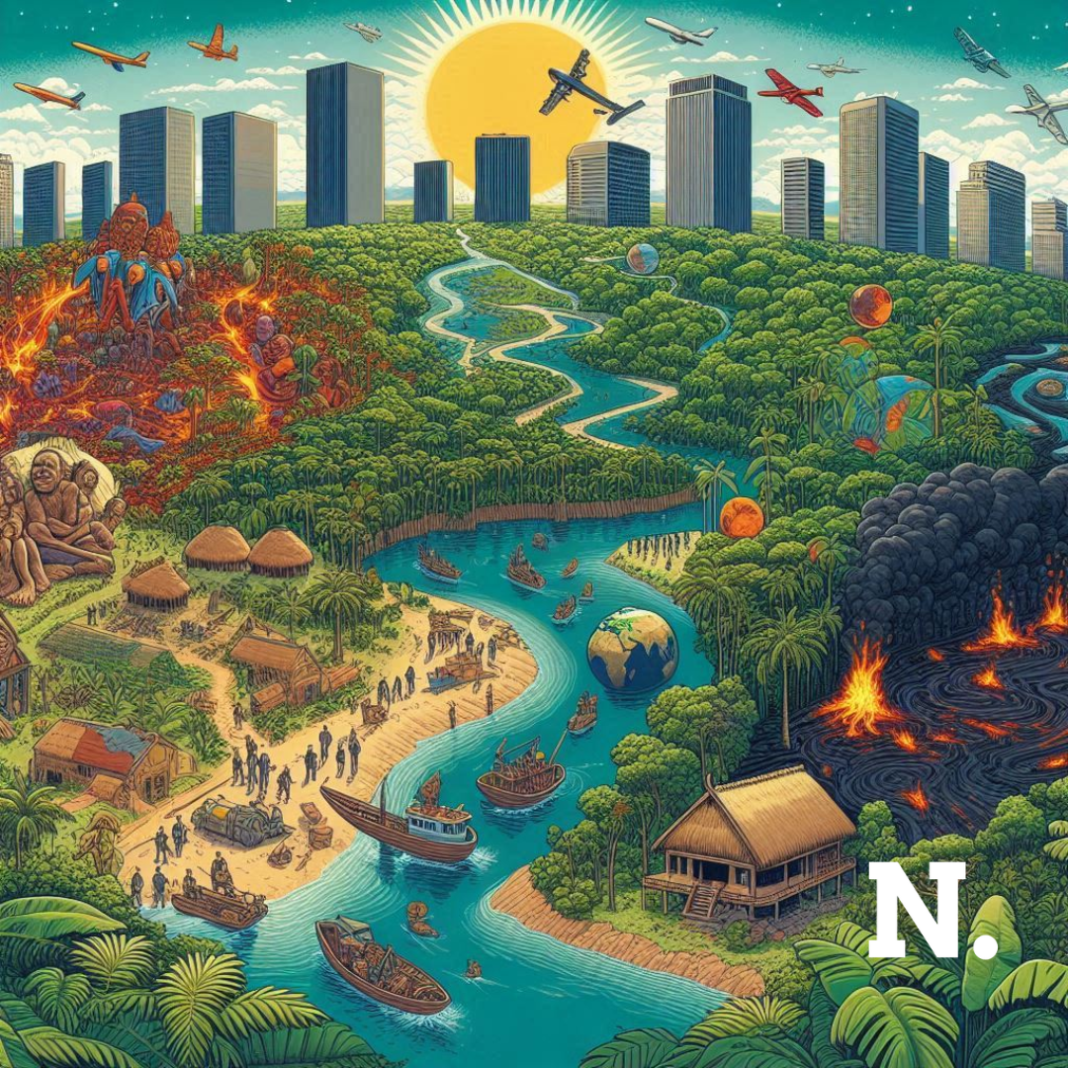According to a recent study, five of the biggest banks in the world are allegedly “greenwashing” their roles in the devastation of the Amazon rainforest.
According to the analysis, over 70% of the Amazon is not sufficiently protected by the environmental and social policies of these banks.
These institutions allegedly provided substantial financing to oil and gas companies whose projects harm the rainforest, destabilize the climate, and threaten the land and livelihoods of Indigenous peoples.
Banks’ Ethical Policies Regarding the Amazon
The banks in question—Citibank, JPMorgan Chase, Itaú Unibanco, Santander, and Bank of America—claim to adhere to ethical policies aimed at safeguarding intact forests, biodiversity hotspots, indigenous territories, and nature reserves. However, the investigation, conducted by Stand.earth and the Coordinating Body of Indigenous Organizations of the Amazon Basin (COICA), suggests that these guidelines have significant geographical and technical limitations, impairing their effectiveness in protecting the Amazon.
Extent of Financial Involvement
The report reveals that these five banks are responsible for over half of the loans to fossil fuel operators in the Amazon region. On average, the banks’ risk management policies fail to cover 71% of the Amazon for issues related to climate change, biodiversity, forest cover, and Indigenous communities’ rights. JPMorgan Chase, for instance, limits its biodiversity protections to UNESCO world heritage sites, which only encompass 2% of the Amazon and are generally not considered for oil and gas exploration.
HSBC’s Initiative with regards to Amazon
The report commends HSBC, a British bank, for its comprehensive exclusion policy adopted in December 2022, which has resulted in no new financing for destructive projects in the Amazon. This example demonstrates that such policies can be effective, as noted by Angeline Robertson, the lead author of the report.
Challenges with Current Financial Practices
Many banks contend that by pushing extractive businesses to adopt more responsible policies, they contribute positively.
The report finds most funding comes from syndicated general corporate bonds. These bonds have broad purposes and weak follow-up. This makes it hard to track if environmental or social concerns are met. Santander, the top European funder for Amazon oil and gas, has a wide exclusion zone (16%). But 85% of its transactions are through syndicated bonds. This reduces transparency and accountability for negative impacts.
Detailed Examination of Financial Transactions
A study examined financial activity in the Amazon. The study looked at over 560 transactions involving oil and gas operations by 280 banks. This covered the prior 20 years and used data from the Stand.earth Amazon Banks Database. Citibank and JPMorgan Chase were the top financiers. They provided $2.43 billion and $2.42 billion respectively to companies linked to Amazon oil and gas projects. Interestingly, JPMorgan Chase recently left the Equator Principles Association. This group sets standards for managing environmental and social risks in project financing.
Lack of Effective Exclusion Policies
Itaú Unibanco, a major Amazon financier for 20 years, has no policies to exclude or screen oil and gas operations. Last year’s top financier, Bank of America, did 99% of its deals through syndicated bonds. These bonds escape stricter ESG (environmental, social, and governance) checks.
Calls for Comprehensive Exclusion Policies
The study recommends that banks implement thorough geographic exclusion guidelines that address all transactions pertaining to the Amazon’s oil and gas industry.
This is deemed essential to protect the rainforest, which is the world’s most important terrestrial carbon sink and a biodiversity hotspot, from reaching a point of no return.
Fany Kuiru, the general coordinator of COICA, emphasized the critical role of the Amazon for the planet’s future. Kuiru argued that banks must be held accountable for the damage their financing causes to Amazonian Indigenous peoples and biodiversity. COICA requests that JPMorgan Chase, Bank of America, Santander, Itaú Unibanco, and Citibank stop financing for oil and gas in the Amazon.
Industry Response and Future Opportunities
Stand.earth’s Robertson observed that the five banks’ strategies frequently seem to focus more on reputational risk management than practical consequences.
However, she believes there are opportunities for banks to improve their ESG policies and exclude petroleum projects in the rainforest from their portfolios.
The report’s methodology has critics in finance. They argue it’s wrong to combine multi-year financing with other credit. This creates an inflated figure for a specific group. Most credit markets, they say, are general corporate loans. Only companies know how this capital is ultimately used.
Banks’ Defense of Their Practices with regards to Amazon
In response, Citibank pointed to its comprehensive enterprise security risk management policy, which involves enhanced due diligence for activities with elevated environmental and social risks. JPMorgan Chase declared that it is in favor of basic human rights in all areas and industries, including the rights of Indigenous peoples.
The bank also mentioned its 2023 ESG report, which outlines its policies and practices regarding environmental and social risks.
Bank of America highlighted its environmental and social risk policy framework. This framework includes heightened due diligence for transactions impacting Indigenous people. Santander emphasized its commitment to the Amazon’s protection. It also supports sustainable development through a strict policy and industry involvement.
Conclusion
The report by Stand.earth and COICA calls for a significant shift in bank management of environmental responsibilities. It emphasizes the importance of social responsibilities, particularly in the Amazon. The ongoing degradation of the rainforest underscores this urgency. Banks must adopt more stringent exclusion policies. They need to ensure their financing practices do not harm this critical ecosystem.





